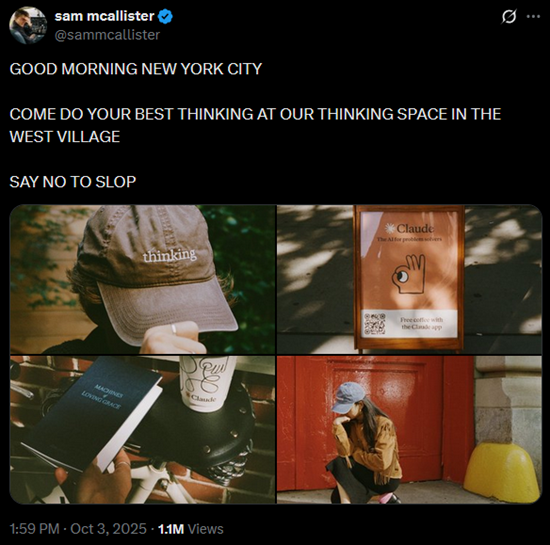Claude's café pop-up convinced me to switch LLMs
There’s a new cool kid on the AI block, and its name is Anthropic.
On my recent trip to New York, I noted the huge poster campaigns for its Claude large language models (LLMs), but it turned out that was just the beginning. Just after I flew back to the UK, X was brimming with posts from its pop-up “thinking space” - a temporary takeover of a West Village café.
Beyond the arty photos, the free coffees, and the “thinking” caps (which I’ll be all over if they pull a similar stunt in London), Anthropic’s event marked a departure from typical, sterile AI branding. It had colour, rough edges, a human touch. The message and the timing seemed very deliberate.

The campaign and its “say no to slop” vibe emerged just after OpenAI launched its Sora 2.0 video generation model, which quickly flooded social media with exactly the type of content the word “slop” was coined for. With AI descending into a geek-endorsed TikTok, Claude is positioned as a “thinking partner” - a serious model to support serious work by “problem solvers”. It markets itself as a tool for humans, not a replacement.
On returning from New York, I registered for Claude and downloaded the app. ChatGPT was always my daily driver LLM, almost by default as the first on the scene. Part out of curiosity, and part driven by FOMO as the tech crowd gushed about Anthropic’s marketing, I switched to Claude for a few days to see how it measured up against my incumbent chatbot.
Thoughts on my new thinking partner
Claude feels more soulful. LLMs don’t have souls (yet), but the teams behind them do. That’s not always reflected in their products, however. ChatGPT’s interface represents the blandest of modern tech design, while Claude’s has some personality. There are serifs, other typefaces you can distinguish from Helvetica and Roboto, and even small splashes of orange. While there is similar infrastructure at its core, this styling makes it feel less like a direct interface with a server, and more like a creative’s notebook.
Claude feels more discerning. ChatGPT is like an enthusiastic dog bounding along at your side, happy to go whichever way you choose because it’s just so ecstatic to be there. What a great question! Despite the “you are absolutely right!” meme, Claude seems harder to impress. When I share my ideas, it identifies their flaws and drops what it calls “uncomfortable truths”. It’s too early to tell whether that makes the output better, but it feels more constructive than a virtual yes man signing off on everything I throw at it.
Head to head
I don't usually use AI in my writing, but in search of a solid example to illustrate this point, I asked both ChatGPT and Claude to review a draft of this article and assign a score out of ten. ChatGPT gave it an 8.5, while Claude gave it a 6.5 - with a host of suggestions to strengthen the core arguments and structure.
Claude’s answers are more complete. Anecdotally, Claude gives me the impression that it thinks further ahead than any model I’ve used before. I’ll ask it a question, and it will give a long answer that would have required a couple of follow-up requests to other LLMs. This saves time when I know what I’m looking for, and opens up other lines of thinking when I don’t.
One reason for the longer answers is Claude’s transparency. When asked a logical question requiring multiple steps of reasoning - particularly those that involve web requests or arithmetic - it shows the user its workings in real time, which helps to ensure it isn’t barking up the wrong tree.
Claude is hard to impress. It identifies flaws in my ideas, drops what it calls "uncomfortable truths", and feels more constructive than ChatGPT
Problems yet to be solved
Claude isn’t clear about its limits. According to the website, the free tier has “a session-based usage limit that will reset every five hours”, and the Pro plan “offers at least five times the usage per session”. But that varies based on demand, so you can never reliably predict when you’ll be cut off. It hasn’t happened often, even on the free tier, but when you do see that message it’s frustrating to be blocked in the middle of an interesting thread.
Hallucination is still an issue. No LLM is perfect, but Claude’s answers have already included a few identifiable inaccuracies. It even made things up about web pages I asked it to analyse. I’ll need a larger sample size to say with any confidence whether it’s worse for this than ChatGPT, but just like any of its competitors, Claude’s output still requires careful validation.
My new daily driver
Will I continue to use Claude? Probably. It’s impressed me. Logically, I know that LLMs are only linguistic probability calculators, but Claude feels more like the thinking partner it strives to be than other models. In large part this is because it challenges me, rather than simply reinforcing whatever I feed it.
It is hard to justify paying for the Pro plan when the usage limits are so ambiguous, but my trial run has passed the stickiness test, and I now only turn to ChatGPT when Claude is unavailable. Perhaps Anthropic will make the value proposition clearer in future and I’ll reconsider my options.
The branding, the café pop-up, and so on have achieved something similar to Death Stranding 2’s launch buzz: Anthropic has taken a digital product and turned it into something tangible in the real world. That would mean nothing if the model wasn’t good, but it is, just as Kojima’s game was. In a sector full of bland interfaces, incomprehensible sums of money, and endless AI slop, a human focus sets Claude apart in my mind, and seemingly many others.

